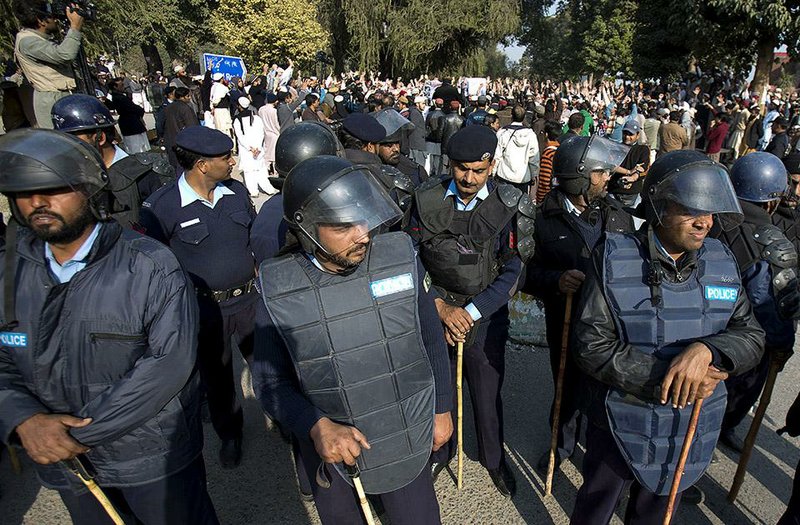ISLAMABAD -- Pakistan hanged two convicted militants Friday -- the country's first executions in years -- after the government reinstated the death penalty in response to a Taliban school massacre this week that killed 148, most of them children.
The military also stepped up an offensive against the militants in the Khyber tribal region in northwest Pakistan, along the border with Afghanistan, with warplanes and ground forces pounding hideouts. A total of 77 militants were killed in the operation, which started late Thursday and went on throughout the day Friday.
The home minister for Punjab province, where the two convicted men were hanged Friday, confirmed their deaths.
"We have started these executions by hanging two terrorists," Shuja Khanzada said. He identified the two men as Mohammed Aqeel and Arshad Mahmood and said they were executed at a prison in the central Punjabi city of Faisalabad.
"Today's executions of terrorists will boost the morale of the nation, and we are planning to hang more terrorists next week," he said.
Both Aqeel and Mahmood were tried in military courts, so little is known about their court proceedings. Pakistani media reported that Aqeel was convicted in relation to a 2009 attack on army headquarters and Mahmood for his role in a plot to assassinate former President Pervez Musharraf.
The Pakistani army chief late Thursday signed the death warrants of six "hard-core terrorists" convicted and sentenced to death by military courts. At the time, no date was given for the executions, but authorities moved quickly after the warrants were signed.
Prime Minister Nawaz Sharif announced Wednesday that he would lift a moratorium on executions in terrorism-related cases as part of efforts to crack down on militants after the Peshawar school killings.
The Taliban threatened earlier Friday to kill more children if executions were carried out as promised.
"We can create a mourning situation at the homes of many army generals and politicians," spokesman Mohammad Khurassani said in a statement emailed to reporters.
Meanwhile, the military said its ground forces late Thursday killed 10 militants and airstrikes killed another 17, including an Uzbek commander. Another 32 terrorism suspects were killed by security forces in an ambush Friday in Tirah valley in Khyber as they headed toward the Afghan border, the military said.
On Friday morning, troops killed 18 more militants during a "cordon and search operation" in Khyber, the military said.
The military said the army chief, Gen. Raheel Sharif, was traveling Friday to Khyber to meet with troops taking part in the ground operation.
Khyber is one of two main areas in northwestern Pakistan where the military has been trying to root out militants in recent months. Khyber borders Peshawar, where the school massacre happened, and militants have traditionally attacked the city before withdrawing to the tribal region where police cannot chase them.
The other area is North Waziristan, where the military began an operation against the militants in June.
Also Friday, Pakistani security forces killed a senior Pakistani Taliban leader along with seven of his associates in three pre-dawn raids in the southern province of Baluchistan, said a tribal police officer, Ali Ahmed.
Analysts said the Islamabad government needs strong public support to continue the fight against insurgents in the northwest.
Many Pakistanis believe the militants are holy warriors taking up arms against Pakistan only because the government aligned with the unpopular U.S.-led war in Afghanistan. A network of seminaries and religious schools promote religious hate, and some of their leading clerics command widespread respect in the country.
Maulana Abdul Aziz, a radical cleric in Islamabad, warned in his Friday sermon at the famous Lal Masjid mosque about a backlash over the executions.
Aziz expressed his sorrow over the schoolchildren's deaths but also called for ending the operation against the Taliban in the tribal regions of North Waziristan and Khyber. He called the Taliban "our brothers" and warned that if the military continues its bombardment, "there will be a reaction."
But a few hundred people protested Friday night outside the Lal Masjid mosque, calling for an end to support for the militants.
"We wanted to also send this message that it's not enough for the government to take action against terrorists but it's equally important that we should also take action against these supporters of the Taliban," said human-rights activist Farzana Bari.
In schools across Pakistan, special classes were held Friday, with schoolchildren chanting prayers in memory of the victims of the Taliban slaughter.
In mosques throughout the country, worshippers also offered special prayers for the massacred innocents in Peshawar.
Information for this article was contributed by Zarar Khan and Asif Shahzad of The Associated Press.
A Section on 12/20/2014
